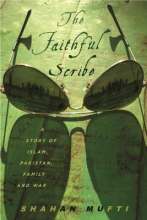- Categories:
Indies Introduce Debut Author Q&A With Shahan Mufti
 Journalist Shahan Mufti explores his family history and that of the Islamic civilization in Pakistan in the Fall 2013 Indies Introduce Debut Authors title The Faithful Scribe: A Story of Islam, Pakistan, Family and War (Other Press).
Journalist Shahan Mufti explores his family history and that of the Islamic civilization in Pakistan in the Fall 2013 Indies Introduce Debut Authors title The Faithful Scribe: A Story of Islam, Pakistan, Family and War (Other Press).
Mufti has written for Harper’s Magazine, WIRED, the New York Times Magazine, Bloomberg Businessweek, and The Atlantic, among other publications. From 2007 – 2009, he reported from Pakistan for the Christian Science Monitor and later joined the team that launched GlobalPost, an online portal for international news. Mufti lives with his wife in Virginia, where he is an assistant professor of journalism at the University of Richmond.
What inspired you to write this book?
Shahan Mufti: Living my entire life between parallel, often conflicting, worlds — Pakistan and America, Islam and the West — propelled me to write this book. I wanted to translate one of my homes — Pakistan — to my other home: America and the West. When I found my family tree, written centuries ago by an ancestor who was a British colonial subject, and which tied my blood to the Islamic prophet Muhammad’s inner circle, I realized that this story literally runs through my veins.
If you were handselling your debut, how would you pique a customer’s interest?
S.M.: I would ask readers about their own ancestry and the history of their surname. What does it all mean to them? And then I would tell them the story behind my surname, “Mufti.” It means the “giver of fatwas,” and I found that my ancestors issued fatwas or Islamic rulings in the courts of Muslim emperors. My surname, like many others’ names, is a portal into a rich past full of stories.
Are you working on anything now?
S.M.: I am working on a few magazine articles — one about converts to Islam in America, another one about a British boxer trying to break into America, and finally one about Malala Yusufzai, the young Pakistani girl who was nominated for the Nobel Peace Prize this year. I am also beginning a new book project that explores a string of murders across the world, tied together by their common motive.
What do you hope readers take away from your book that either enlightens or changes how they view Pakistan?
S.M.: While researching this book, I was surprised by how much America and Pakistan mirror each other as countries. They are both multi-lingual, multi-ethnic nations tied together by common ideas more than anything else. The two countries also share a common language, English, a product of the two countries’ experience of British colonial rule for centuries. I would like my reader to come away from the book with great hope for the relationship between the two countries, and also between Islam and the west, just as I did.
When you travel, do you often stop at bookstores? Are there any particular indies that have made a lasting impression?
S.M.: I recall my excitement when Greenlight Bookstore opened in my old neighborhood of Fort Greene in Brooklyn. I was working as a freelance magazine writer at that time, and I was drawn to the Greenlight like a moth to the flame. I first began formulating my ideas for this book during the hours I spent in that bookstore.
What are some of your favorite works of nonfiction?
S.M.: My Traitor’s Heart by Rian Malan. The Looming Tower by Lawrence Wright. Bad Land by Jonathan Raban.
If you were a bookseller for a day, what book would you want to put in every customers hand? (Besides your own, of course!)
S.M.: The Book of Embraces by Eduardo Galeano. I believe that book rewired my brain, and I keep returning to it.
If you could invite any authors (past or present) to a dinner party, who would they be? What do you think would be the topic of conversation?
S.M.: I would make the most of it and invite George Orwell, Gabriel Garcia Marquez, and Rebecca Solnit — three writers from three different generations and three different continents, all of whom began their writing careers as journalists. The topic for the evening would be “The natural environment.”
Shahan Mufti, The Faithful Scribe: A Story of Islam, Pakistan, Family, and War (Other Press, Hardcover, 9781590515051) Publication Date: September 24, 2013
ABA member stores are invited to use this, or any in our series of Q&As with Indies Introduce Debut Authors, in newsletters and social media and in online and in-store promotions (and please let us know if you do).
Learn more about Shahan Mufti at shahanmufti.com/book.html

